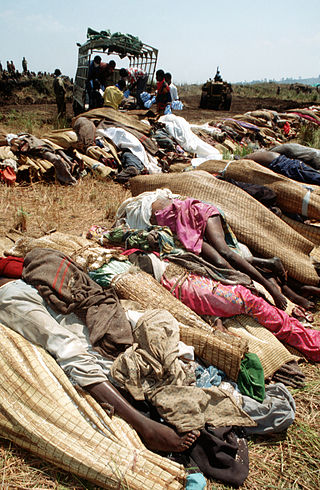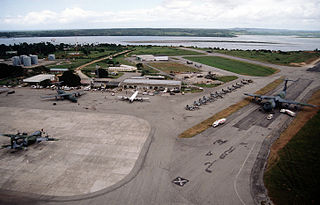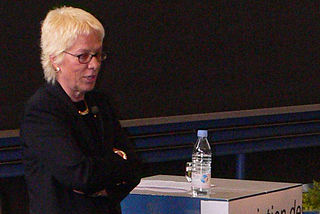
United Nations Security Council resolution 940, adopted on 31 July 1994, after recalling resolutions 841 (1993), 861 (1993), 862 (1993), 867 (1993), 873 (1993), 875 (1993), 905 (1994), 917 (1994) and 933 (1994), the Council permitted a United States-led force to restore President Jean-Bertrand Aristide and authorities of the Government of Haiti, and extended the mandate of the United Nations Mission in Haiti (UNMIH) for an additional six months.

The United Nations Assistance Mission for Rwanda (UNAMIR) was established by United Nations Security Council Resolution 872 on 5 October 1993. It was intended to assist in the implementation of the Arusha Accords, signed on 4 August 1993, which was meant to end the Rwandan Civil War. The mission lasted from October 1993 to March 1996. Its activities were meant to aid the peace process between the Hutu-dominated Rwandese government and the Tutsi-dominated rebel Rwandan Patriotic Front (RPF). The UNAMIR has received much attention for its role in failing, due to the limitations of its rules of engagement, to prevent the Rwandan genocide and outbreak of fighting. Its mandate extended past the RPF overthrow of the government and into the Great Lakes refugee crisis. The mission is thus regarded as a major failure.

The United Nations Mine Action Service (UNMAS) is a service located within the United Nations Department of Peacekeeping Operations that specializes in coordinating and implementing activities to limit the threat posed by mines, explosive remnants of war and improvised explosive devices.

United Nations Security Council resolution 728, adopted unanimously on 8 January 1992, after recalling resolutions 668 (1990), 717 (1991) and 718 (1991), the Council welcomed the implementation by all parties of the agreement in Paris on 23 October 1991, but expressed concern at the existence of land mines in Cambodia.

United Nations Security Council resolution 872, adopted unanimously on 5 October 1993, after reaffirming resolutions 812 (1993) and 846 (1993) on the situation in Rwanda and Resolution 868 (1993) on the security of United Nations operations, the council stressed the need for an international force in the country and therefore established the United Nations Assistance Mission for Rwanda (UNAMIR).

United Nations Security Council resolution 918 was adopted without a vote on 17 May 1994. After reaffirming all resolutions on the situation in Rwanda, particularly resolutions 872 (1993), 909 (1994) and 912 (1994), the Council expressed its alarm and condemnation at the continuing large-scale violence, and went on to impose an arms embargo on the country and authorise an expansion of the United Nations Assistance Mission for Rwanda (UNAMIR).

United Nations Security Council resolution 925, adopted unanimously on 8 June 1994, after reaffirming all resolutions on the situation in Rwanda, particularly resolutions 912 (1994) and 918 (1994), and Resolution 868 (1993) on the safety of United Nations peacekeepers, the council deployed additional battalions and extended the mandate of the United Nations Assistance Mission for Rwanda (UNAMIR) until 9 December 1994.
United Nations Security Council resolution 928, adopted unanimously on 20 June 1994, after reaffirming resolutions 812 (1993), 846 (1993) and 891 (1993) on the situation in Rwanda, the Council stressed the need to continue to implement the arms embargo on the country imposed in Resolution 918 (1994) and extended the mandate of the United Nations Observer Mission Uganda–Rwanda (UNOMUR) for a final period of three months until 21 September 1994.

United Nations Security Council resolution 929, adopted on 22 June 1994, after recalling all resolutions on Rwanda, including 912 (1994), 918 (1994) and 925 (1994), the council authorised, under Chapter VII of the United Nations Charter, the temporary establishment of a multinational operation in the country to assist in humanitarian efforts and protect refugees and displaced people, until the full deployment of the expanded United Nations Assistance Mission for Rwanda (UNAMIR).

United Nations Security Council resolution 935, adopted unanimously on 1 July 1994, after recalling all resolutions on Rwanda, particularly 918 (1994) and 925 (1994), the Council requested the Secretary-General Boutros Boutros-Ghali to establish a Commission of Experts to investigate violations of international humanitarian law during the Rwandan genocide.

United Nations Security Council resolution 965, adopted unanimously on 30 November 1994, after reaffirming all resolutions on the situation in Rwanda, particularly resolutions 872 (1993), 912 (1994), 918 (1994), 925 (1994) and 955 (1994), the Council extended the mandate of the United Nations Assistance Mission for Rwanda (UNAMIR) until 9 June 1995 and expanded its operations.

United Nations Security Council resolution 978, adopted unanimously on 27 February 1995, after recalling all previous resolutions on Rwanda, including 935 (1994) and 955 (1994), the Council instructed Member States on the arrest and detention of persons responsible for acts during the Rwandan genocide, within the jurisdiction of the International Criminal Tribunal for Rwanda (ICTR).

United Nations Security Council resolution 997, adopted unanimously on 9 June 1995, after reaffirming all resolutions on the situation in Rwanda, particularly resolutions 872 (1993), 912 (1994), 918 (1994), 925 (1994), 955 (1994) and 965 (1994), the Council extended the mandate of the United Nations Assistance Mission for Rwanda (UNAMIR) until 8 December 1995 and adjusted its operations from peacekeeping to confidence-building.

United Nations Security Council resolution 1008, adopted unanimously on 7 August 1995, after reaffirming Resolution 696 (1991) and all subsequent resolutions on Angola, the Council discussed the monitoring of a ceasefire and implementation of peace accords, and extended the mandate of the United Nations Angola Verification Mission III until 8 February 1996.

United Nations Security Council resolution 1011, adopted unanimously on 16 August 1995, after recalling resolutions 918 (1994), 997 (1995) and 1005 (1995) on the situation in Rwanda, the Council suspended the arms embargo against the Government of Rwanda.

United Nations Security Council resolution 1029, adopted unanimously on 12 December 1995, after recalling previous resolutions on Rwanda, including Resolution 872 (1993), Resolution 912 (1994), Resolution 918 (1994), Resolution 925 (1994), Resolution 955 (1994), Resolution 965 (1994), Resolution 978 (1995) and Resolution 997 (1995), the Council extended the mandate of the United Nations Assistance Mission for Rwanda (UNAMIR) for a final time, ending 8 March 1996, and adjusted its mandate.

United Nations Security Council resolution 1053, adopted unanimously on 23 April 1996, after recalling all previous resolutions on Rwanda, particularly resolutions 918 (1994), 997 (1995), 1011 (1995) and 1013 (1995), the Council reviewed the findings of the Commission of Inquiry concerning violations of the arms embargo against former Rwandan government forces.

United Nations Security Council resolution 1161, adopted unanimously on 9 April 1998, after recalling all previous resolutions on Rwanda, particularly resolutions 918 (1994), 997 (1995), 1011 (1995), 1013 (1995) and 1053 (1996), the Council reactivated the Commission of Inquiry concerning violations of the arms embargo against former Rwandan government forces.

United Nations Security Council resolution 1335, adopted unanimously on 12 January 2001, after recalling previous resolutions on Croatia, including resolutions 779 (1992), 981 (1995), 1088 (1996), 1147 (1998), 1183 (1998), 1222 (1999), 1252 (1999), 1285 (2000), 1305 (2000) and 1307 (2000), the Council authorised the United Nations Mission of Observers in Prevlaka (UNMOP) to continue monitoring the demilitarisation in the Prevlaka peninsula area of Croatia for six months until 15 July 2001. It was the first Security Council resolution adopted in 2001.

United Nations Security Council resolution 1503, adopted unanimously on 28 August 2003, after recalling resolutions 827 (1993), 955 (1994), 978 (1995), 1165 (1998), 1166 (1998), 1329 (2000), 1411 (2002), 1431 (2002) and 1481 (2003), the Council decided to split the prosecutorial duties of the International Criminal Tribunal for the former Yugoslavia (ICTY) and the International Criminal Tribunal for Rwanda (ICTR) which had previously been under the responsibility of one official, Carla Del Ponte, since 1999.


















